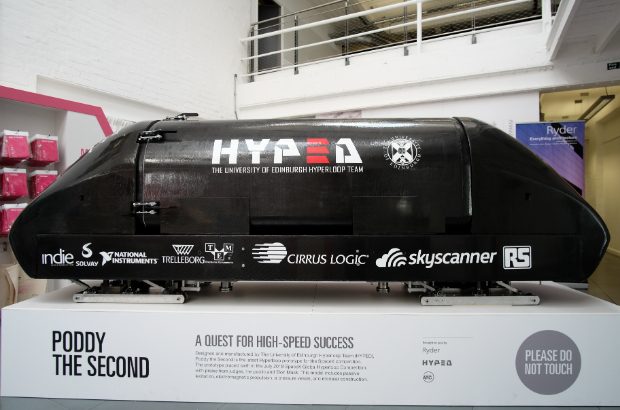Guest post by Matt Blythe and Grzegorz Marecki, 2 of the 4 co-founders of Continuum Industries, the UK’s first start-up focussed on implementing hyperloop technology.
https://www.youtube.com/watch?v=LAWEOwDDt_Y
(Read a transcript of the video.)
The UK government recently released a call for evidence on how automation, data and connectivity, cleaner transport, new modes and shared mobility will change the way people and goods move in the future, to understand how the UK can take full advantage of each of these trends.
So, what do these words mean to most people?
Greater usage of ride-sharing apps, electric vehicles and the introduction of self-driving cars on our roads perhaps.
For us though, it means something even more disruptive: a new mode of mass transport that could compete with air and rail travel called hyperloop.
What is a hyperloop?
Hyperloop is a high-speed ground-based transportation system that carries passengers or freight in autonomous, bus-sized vehicles known as pods.
It works by moving the pods within a network of low-pressure tubes with magnetic levitation and electromagnetic propulsion to minimise aerodynamic drag and reduce wear and tear, allowing the pods to travel at speeds of around 1,000kph.
Once the technology is proven at large scale and certified for commercial use then it will do more than just cut journey times.
For a country the size of the UK, it will reduce travel between most cities to less than one hour, allowing more and more individuals to live in areas with affordable housing and access better paid jobs without the need to relocate.
(The Northern Arc – one of the winning UK hyperloop routes proposed for the Hyperloop One Global Challenge. Credit: Ryder Architecture, Arup and KPMG. Read a transcript of the video.).
Granted, this technology is at least 10 to 15 years away from reaching the masses, but a number of companies have already raised close to $1 billion to develop and test the concept.
The largest company in the field is US-based, Virgin Hyperloop One, which is currently involved in several feasibility studies for commercial hyperloop routes in the USA and other countries. It is also due to start construction of a large test track in India soon, with the aim to certify the technology for freight and passenger applications by the mid 2020s.
Meanwhile, a number of other companies in Canada, Netherlands, Poland and Spain are developing their own versions of hyperloop technology and planning testing facilities, with considerable financial and political support from their own governments in some cases.
Global race with opportunities for UK industries
In other words, there is now a global technology race on to establish a standard for hyperloop technology.
For the UK, the most immediate opportunity is in leveraging its strengths in the aerospace, automotive, construction, engineering, infrastructure consultancy and research industries to contribute to the development and commercialisation of the technology in other countries.
The Transport Systems Catapult has already assessed this in some detail and outlined a series of broad initiatives that the UK government could undertake to position UK industry for these opportunities, and better understand the potential for a hyperloop in the UK.
We also see overlap in research between high-speed rail and hyperloop technology in areas such as tunnelling, digital signalling, traffic control and other control systems which could be coordinated through the UK’s newly established rail research centres of excellence.

Our own company, Continuum Industries, is the first UK company dedicated to pushing the hyperloop technology from concept to implementation.
Our goal is to create the first-of-its-kind ‘digital super-twin’ of hyperloop. We hope that our software will cut technology development times and costs as well as support hyperloop project delivery over the entire lifecycle by optimising hyperloop system design, supply chain integration and operations.
